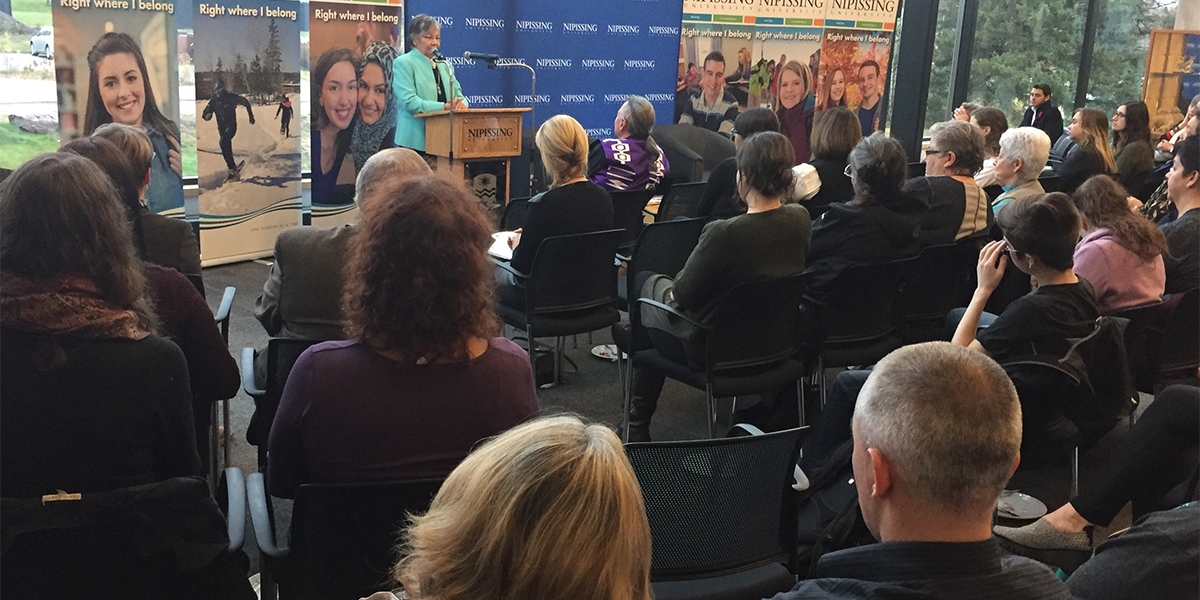Reconciliation North Bay launches

Reconciliation will be a long journey that will take political will and a multigenerational and multi-institutional commitment. Locally, an important step on that journey took place today with the launch of Reconciliation North Bay. Reconciliation North Bay will become a community-wide initiative with support from the business, education, social service, political, justice, arts and faith sectors working towards increased understanding of and work towards reconciliation. It is part of the larger conversation about reconciliation stemming from the groundbreaking Truth and Reconciliation Commission. The local effort is grounded in the Community Action Circles of the Urban Aboriginal Strategy.
The event was part of a larger series of events marking Indigenous Week at Nipissing University.
The roughly 75 people in attendance heard speeches from a number of different individuals spearheading the Reconciliation North Bay initiative. Speakers included June Commanda, an Elder who is a Nipissing First Nation Council Member and Residential School Survivor; Dr. Mike DeGagné, President and Vice-Chancellor of Nipissing University; Dawn Lamothe, the North Bay Urban Aboriginal Strategy Coordinator; Rachel Norman, Chair of the Cultural Working Group for the North Bay Urban Aboriginal Strategy; Dakota Heon, a second-year Nipissing University student; and Tanya Lukin-Linklater, Director of Nipissing University’s Office of Aboriginal Initiatives.
In her speech, Commanda recalled the hard times of her own time spent in a residential school, which she realized years later, was much like a prison.
"They say time heals all wounds; it didn’t for me,” she said. “Now I work to help my people. I got over the hurt and the hate that I had in me, but I want everyone to know what happened to those kids in the residential schools.”
Commanda received a standing ovation for sharing her experiences.
Heon used his time at the podium to expand the definition of reconciliation.
“We need to reconcile our relationship with mother earth,” he said. “Violence against the earth is violence against all of us. It is important for reconciliation to keep mother earth in mind.”
Heon also recognized the people protesting the Dakota Access pipeline in North Dakota, offering a moment of reflection for everyone to consider their struggle.
Dr. DeGagné was introduced as the Chair of Reconciliation North Bay. He spoke about the history of reconciliation in Canada, reflecting on the twenty-year old Royal Commission on Aboriginal Peoples, which began the process.
“We know there are problems with Canada’s Indigenous populations. We know there are problems from the Residential Schools. There is a desire to make change but there is no blueprint offered to show us how,” he said. “So, we are going to start this process locally. We can follow some of the steps laid out in the Urban Aboriginal Strategy and we will call on local people, local champions to act and help us.”
Degagné then recognized some local champions that have already offered assistance, including: Al McDonald, Mayor of North Bay; Jake Lacourse, North Bay and District Chamber Of Commerce; Paul Heinrich, North Bay Regional Health Centre; Katherine Sarazin, North Bay Indian Friendship Centre; Rob Boulet, OPSEU; and Sister Priscilla Solomon, Faith Community.
“It is vitally important that people understand that Reconciliation involves all Canadians, and it is going to be a long process requiring national, provincial and municipal government commitment, as well as the commitment of institutions, like school boards and universities, hospitals, police forces and social services to pull together,” said Lukin-Linklater. “Today’s event brought many of these organizations, represented locally, together to show their mutual commitment to reconciliation. Much work and education lies in front of us.”
Earlier in the day, as part of Indigenous Week, Nipissing launched the RBC Treaty Learning Centre and heard the Honourable David Zimmer, Minister of Indigenous Relations and Reconciliation, and Ontario Human Rights Commissioner Maurice Switzer speak about Reconciliation in Ontario.
The RBC Treaty Learning Centre offers space for hosting talks that will provide insight into treaty relationships in Canada and houses archival maps, publications, curriculum resources and a replica wampum belt gifted to the RBC Treaty Learning Centre by Anishnabek, Union of Ontario Indians.For more information about Indigenous Week, click here.
For over 150 years, residential schools operated in Canada. Over 150,000 children attended these schools. Many never returned. Often underfunded and overcrowded, these schools were used as a tool of assimilation by the Canadian state and churches. Thousands of students suffered physical and sexual abuse. All suffered from loneliness and a longing to be home with their families. The damages inflicted by these schools continue to this day. In 2009, the Truth and Reconciliation Commission of Canada began a multi-year process to listen to Survivors, communities and others affected by the Residential School system. The resulting collection of statements, documents and other materials now forms the heart of the National Centre for Truth and Reconciliation.
